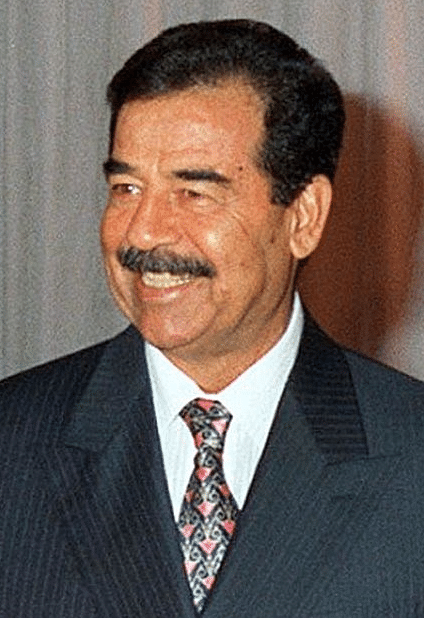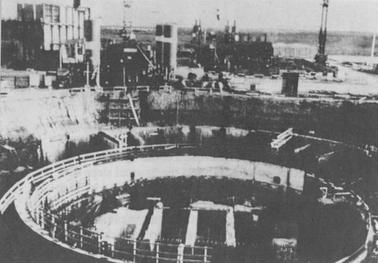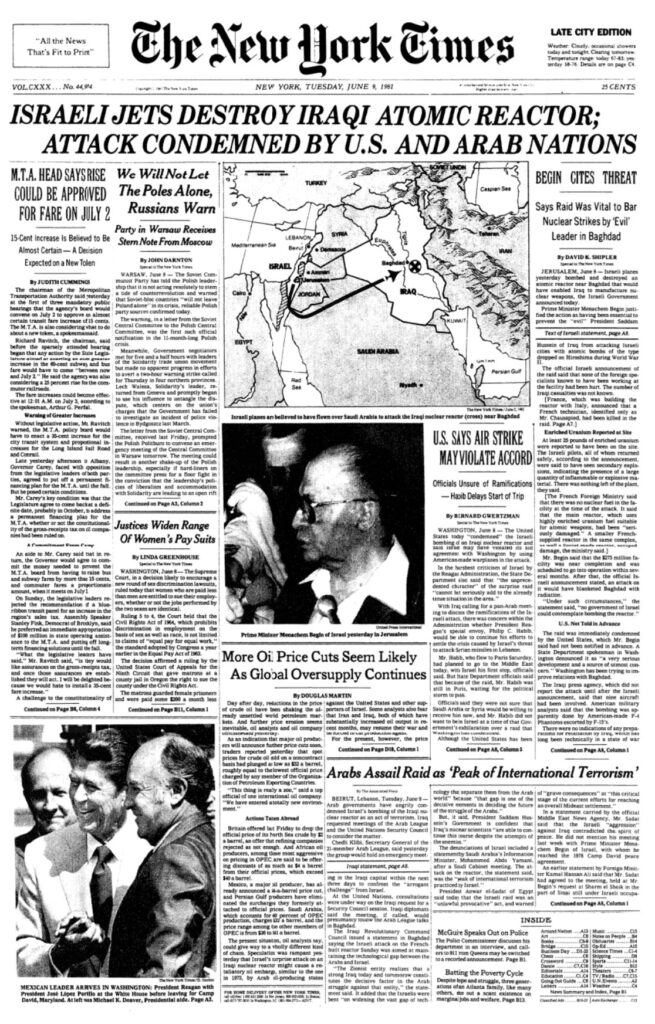Do you like moral dilemmas? I love them.
Ever heard of the Trolley Problem?
There’s a trolley speeding straight towards a group of innocent people. The only way to stop it is to turn it… right into a single bystander. It’s one guy’s life… versus many. It’s a classic moral dilemma.
Unfortunately, there are plenty of real-life examples of this calculus playing out on a massive scale. In the case of Israel, Israeli Prime Minister Menachem Begin’s dilemma in the summer of 1981: Should I authorize a strike on Iraq’s nuclear facility, knowing full well the disastrous consequences of failure?
The trolley in this case is a nuclear bomb. The group of people in its path? That’s the four- million-strong population of Israel at the time. The people who get sacrificed? That’s the pilots taking out the Iraqi nuclear reactor… as well as the entire state of Israel, should the mission fail.
All those lives… resting on one man’s shoulders.
So… what did Begin choose? And what consequences did his choice unleash?
I’m Noam, and you’re watching The History of Israel, Explained.
Yallah, let’s do this.

Okay, picture this. It’s 1981. You’re the 68-year-old Prime Minister of a 33-year-old state that’s already seen three major wars…No, all you history nerds out there…I am not counting 56 or the war of attrition from 67-70 Among your many enemies is the so-called Butcher of Baghdad: brutal Iraqi strongman Saddam Hussein with a top 3 devastating mustache of all despots out there.
You don’t get a nickname like that by being warm and fuzzy. Saddam basically wrote the playbook on how to maintain power (if you’re a ruthless dictator): purges, torture, secret police, disappearances, human rights abuses. And though he hated a lot of things – Iran, Shi’ites, Kurds, free speech – he kept a special place in his heart for the world’s only Jewish state.

He vowed to “drown Israel in rivers of blood” and used the state press to publish his uncle’s screed: Three Whom God Should Not Have Created: Persians, Jews, and Flies. Sample line? Jews are a “mixture of the dirt and leftovers of diverse peoples.” He even recommended his party’s leadership read The Protocols of the Elders of Zion to better understand Israel.
What a guy. A true academic!
But it was his atomic ambitions that made Israel nervous. He made no secret of his pursuit of nuclear power.
Ironically, he had help from one of Israel’s former allies.

France had worked closely with Israel for nearly two decades. But that warm relationship went south when Israel rudely won the Six-Day War in 1967. See, French President Charles de Gaulle wanted to consolidate French influence in the Middle East, elbowing out America. His method? Cozying up to Arab states… who just happened to have oil.
So France stopped selling weapons to Israel… and sold Iraq two shiny new nuclear reactors nicknamed Isis and Osiris. Osiris was big enough to process fuel for a nuclear weapon. Yikes.
Israel knew about all of this. Its intelligence agencies had been wooing French and Iraqis to become informants; bugging offices and telephone lines; and studying the layout of the facilities where the reactor was being stored.
By this point, Israel had enough evidence to show the international community that Iraq was a legitimate threat to world peace. “Are you gonna do something about this?” Begin asked.
And asked. And asked. Each time, world leaders responded the same way airlines respond to complaints…with… crickets.
Israel had to face the prospect of a nuclear Iraq alone.
How did Israel deal with this?

The entire weight of this responsibility rested on 68-year-old PM Menachem Begin. But Begin was never truly alone. He was haunted by six million ghosts… including his parents and brother, murdered by the Nazis. Equally haunting were the millions of Israeli children living under his care. These Jewish children – both the living and the dead – inspired Begin’s entire moral and political philosophy: Never Again. But this was no mere sentiment. It was a coherent political and military precept that would become known as the Begin Doctrine. And it was really quite simple: A country that calls for Israel’s annihilation – like, say, Iraq in 1981 – will never be allowed to acquire weapons of mass destruction.
And whether you agree with Israel’s stance on Iran getting nukes for instance, it’s super important to know where Israelis ARE coming from. Yossi Klein Halevi said it best:
“A Jewish state that allows itself to be threatened with nuclear weapons will forfeit its right to speak in the name of Jewish history.”
So, Israel’s intelligence and military agencies sprang into action.
They bombed shipments of crucial material to Iraq and picked off Iraqi scientists. French technicians started resigning. Iraqi officials grew skittish. But Saddam replaced them all. It became clear that Israel’s efforts were a minor inconvenience to a man with Saddam’s ruthlessness and resources.
It was time for drastic measures. Like destroying the nuclear reactor completely.

Easier said than done, though. Because when Begin floated the idea to his cabinet, they thought he was crazy.
Intelligence officials pointed out that if Israel destroyed the reactor, Saddam would just start again. And this time, he’d be way more secretive.
Others feared the international reaction of allies and enemies alike.
So, what should he do? What would YOU do if you were the leader?
One of Begin’s rivals, actually his nemesis, Shimon Peres – leader of the opposition party – said something to Begin that really went for the jugular, “You’re drumming up trouble to look good in the upcoming elections,” he accused.

Fightin words!
Begin’s entire political career – his entire life! – centered on the preservation of the Jewish people. Did Peres really think he’d risk soldiers’ lives to score political points?
Because make no mistake: destroying Iraq’s nuclear reactor was risky as hell.
Imagine this: you’re an elite military pilot, flying at low altitude to avoid unwanted attention. Your mission is to cross 600 miles of enemy territory bristling with anti-aircraft machinery and ground-to-air missiles.
You know there’s a chance that your radar-jamming machinery might fail, rousing Saudi, Jordanian, and Iraqi pilots. You know there’s a chance of a firefight.
You know you’d rather die in a fiery explosion than survive to be interrogated by the Iraqis.
You know you have this one chance to destroy the Iraqi nuclear reactor.
And, you know what happens to your country if you fail.
Man. I’m stressed just saying all that.
(By the way, important little fact here… one of those pilots later became the very first Israeli astronaut. Ilan Ramon was tragically killed in the Columbia shuttle explosion in 2003. But before that, he was one of the elite pilots who destroyed the Iraqi reactor.)
Back to the story. Begin agonized for months, later reflecting that “…I had sleepless nights… What would become of our children if I did nothing? And what would become of our pilots if I did something?” But soon, he made his choice.
Operation Opera was a go.
Who names these Israeli operations…I want that gig. Amazing name choices.
On June 7, 1981, mere hours before the Jewish holiday of Shavuot, Begin sent out the planes. Then, he called his cabinet to a surprise meeting, told them what he had just authorized, and retreated to his office to pace and pray.
Can you imagine the pressure?
I really feel like I am going to pass out from just thinking about it…Geez, I am so not cut out for that job.
Finally, finally, Begin’s red emergency phone punctures the silence. The IDF Brigadier General barks questions to someone on the other end. But when he puts down the phone, he is smiling. It took ninety seconds for the Israeli air force to annihilate Saddam’s nuclear reactor. The pilots returned without a scratch.
That Shavuot must have been jubilant.
Then the international condemnations came pouring in.
Can you imagine conservatives and liberals agreeing about anything in any year after 2020? Israel found a way to unify both Conservatives and Liberals. They were both pretty much unified in their opposition. British PM Margaret Thatcher criticized Israel’s “grave breach of international law.” The New York Times called the attack “an act of inexcusable and short-sighted aggression.” The UN passed Resolution 487 “strongly condemning” Israel and suggesting that “Iraq is entitled to appropriate redress for the destruction it has suffered.”

Begin’s reaction to all of this?
“Oh, I’m a naughty boy, aren’t I?”
Literally. That’s what he said. Because he was genuinely unconcerned by such censure. He had just averted certain disaster and solidified the military doctrine that would guide Israel for decades. Made it crystal clear that Israel was serious about Never Again. Instilled a feeling of security that the Jewish people hadn’t enjoyed in 2,000 years.
Whether you agree with his policies or not, whether you like his decisions or not, Israelis and Jews across the world owe much of their confidence and pride to a man who analyzed a real-life trolley problem and decided to put the fate of four million people before everything else.
Here is the critical thing about studying history. Sometimes, lessons should be drawn from one scenario to another, and sometimes, the extrapolating that lesson is actually imprecise, and therefore kind of dangerous.
